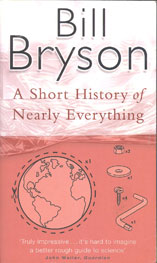|
Salonfourm
|
|
Salonfourm
|

|
 |
| Bill Bryson offizielle Internetseite |  |
 |
 |
 |
Literatur im Salon
A short history
Buchauszug |
Welcome.
And congratulations.
I am delighted that you could make it.
Getting here wasn´t easy, I know.
In fact, I suspect it was a little tougher than you realize.
To begin with, for you to be here now trillions of drifting atoms had somehow to assemble in an intricate and curiously obliging manner to create you. It´s an arrangement so specialized and particular that it has never been tried before and will only exist this once. For the next many years these tiny particles will uncomplainingly engage in all the billions of deft, co-operative efforts necessary to keep you intact and let you experience the supremely agreeable but generally und appreciated stat known as existence.
Why atoms take this trouble is a bit of a puzzle. Being you is not a gratifying experience at the atomic level. For all their devoted attention, your atoms don´t actually care about you – indeed, don´t even know that you are there. They don´t even know that they are there. They are mindless particles, after all, and not even themselves alive. (It is a slightly arresting notion that if you were to pick yourself apart with tweezers, one atom at a time, you would produce a mound of fine atomic dust, none of which had ever been alive but all of which had once been you.) Yet somehow for the period of your existence they will answer to a single rigid impulse: to keep you you.
The bad news is that atoms are fickle and their time of devotion is fleeting – fleeting indeed. Even a long human life adds up to only about 650.00 hours. And when that oddest milestone flashes into view, or at some other point thereabouts, for reasons unknown your atoms will close you down, then silently disassemble and go off to be other things. And that´s it for you.
Still, you may rejoice that it happens at all. Generally speaking in the universe it doesn’t, so far as we can tell. This is decidedly odd because the atoms that so liberally and congenially flock together to form living things on Earth are exactly the same atoms that decline to do it elsewhere. Whatever else it may be, at the level of chemistry life is fantastically mundane: carbon, hydrogen, oxygen and nitrogen, a little calcium, a dash of sulphur, a light dusting of other very ordinary elements – nothing you wouldn´t find in any ordinary pharmacy – and that´s all you need. The only thing special about the atoms that make you is that they make you. That is, of course, the miracle of life.
Whether or not atoms make life in other corners of the universe, they make plenty else; indeed, they make everything else. Without them there would be no water or air or rocks, no stars and planets, no distant gassy clouds or swirling nebulae or any of the other things that make the universe so agreeably material. Atoms are so numerous and necessary that we easily overlook that they needn´t actually exist at all. There is no law that requires the universe to fill itself with small particles of matter or to produce light and gravity and the other properties on which our existence hinges. There needn´t actually be a universe at all. For a very long time there wasn´t. There were no atoms and no universe fir them to float about in. There was nothing – nothing at all anywhere.
So thank goodness for atoms. But the fact you have atoms and that they assemble in such a willing manner is only part if what got you here.
To be here now, alive in the twenty-first century and smart enough to know it, you also had to be the beneficiary of an extraordinary string if biological good fortune. Survival on Earth is a surprisingly tricky business. Of the billions and billions of species of living things that have existed since the dawn of time, mist – 99,99 per cent, it has been suggested – are no longer around. Life on Earth, you see, is not only brief but dismayingly tenuous. It is a curious feature if our existence that we come from a planet that is very good at promoting life but even better at extinguishing it.
The average species on Earth lasts for only about four million years, so if you wish to be around for billions of years, you must be as fickle as the atoms that made you. You must be prepared to change everything about yourself – shape, size, colour, species affiliation, everything – and to do so repeatedly.
That´s much easier said than done, because the process of change is random. To get from protoplasmal primordial atomic globule (as Gilbert and Sullivan put it) to sentient upright modern human has required you to mutate new traits over and over in a precisely timely manner for an exceedingly long while. So at various periods over the last 3.8 billion years you have abhorred oxygen and then doted on it, grown fins and limbs and jaunty sails, laid eggs, flicked the air with a forked tongue, been sleek, been furry, lived underground, lived in trees, been as big as a deer and as small as mouse, and a million things more. The tiniest deviation from any of these evolutionary imperatives and you might now be licking algae from cave walls or lolling walrus-like on some stony shore or disgorging air through a blowhole in the top of your head before diving sixty feet for a mouthful of delicious sandworms.
Not only have you been lucky enough to be attached since time immemorial to a favoured evolutionary line, but you have also been extremely – make that miraculously – fortunate in your personal ancestry. Consider the fact that for 3.8 billion years, a period of time older than the Earth´s mountains and rivers and oceans, every one of your forebears on both sides has been attractive enough to find a mate, healthy enough to reproduce, and sufficiently blessed by fate and circumstances to live long enough to do so.
Not one of your pertinent ancestors was squashed, devoured, drowned, starved, stuck fast, untimely wounded or otherwise deflected from its life’s quest of delivering a tiny charge of genetic material to the right partner at the right moment to perpetuate the only possible sequence of hereditary combinations that could result – eventually, astoundingly, and all too briefly – in you.
Literatur im Salon:
© Bill Bryson
Besuchen Sie das Salonforum:

Briefe an Clair von Graf Battistello von Luang Prabang
Faust – Tragödie 1. Teil Prolog im Himmel von Johann Wolfgang Goethe
Im Namen der Rose von Umberto Eco